[Blog] Pro-Russian Propaganda in Hatoyama’s Tweets
Yukio Hatoyama, the former Prime Minister of Japan, is known for his pro-Russian stance, which he upheld even after the Russian full-scale invasion of Ukraine in 2022. Although pro-Russian propaganda may not be as prevalent in Japan as in some Western countries, it is still discernible in social media, particularly through the activity of certain political actors. Hatoyama is one of the most conspicuous and witting pro-Russian political actors. Others include former Prime Minister Yoshirō Mori (LDP), right-leaning House of Councillors member Muneo Suzuki, and the extreme-right party Issuikai (Kalashnikova and Schäfer 2024). In this blog entry, we will delve deeper into Hatoyama’s pro-Russian stance by analyzing statements made on his X/Twitter 1 account and exploring how pro-Russian narratives penetrate his views on Japan’s foreign policy.
The findings suggest that Yukio Hatoyama’s pro-Russian motives appear rooted in anti-American sentiments and a broader interest in strengthening ties with neighboring countries, notably Russia. Similarly to Issuikai (Kalashnikova and Schäfer 2024), he instrumentalizes the war in Ukraine as a platform to criticize the Japanese government, emphasizing what he perceives as the negative influence of the US on Japan’s foreign policy.
Yukio Hatoyama’s Pro-Russian Foreign Policy Agenda
Yukio Hatoyama is a politician who served as the prime minister of Japan from 2009 to 2010. During his tenure, he pursued a foreign policy agenda called the ‘East Asian Community,’ which aimed to strengthen ties with neighboring countries like China, South Korea, and Russia. He founded the Kyōwa Party (共和党) in 2020. Hatoyama’s pro-Russian stance can be traced back to his family history. His grandfather, Prime Minister Ichirō Hatoyama, who held office from 1954 to 1956, played a significant role in restoring diplomatic relations between Moscow and Tokyo by signing a joint Soviet-Japanese declaration in 1956. Yukio Hatoyama expressed a desire to resolve territorial disputes with Russia, namely the issue of the Kuril Islands. Finally, Hatoyama visited Crimea in 2015 after its annexation by Russia, in the company of Mitsuhiro Kimura, leader of Issuikai, and expressed his support for the illegal and internationally unrecognized referendum (Shekhovtsov 2019).
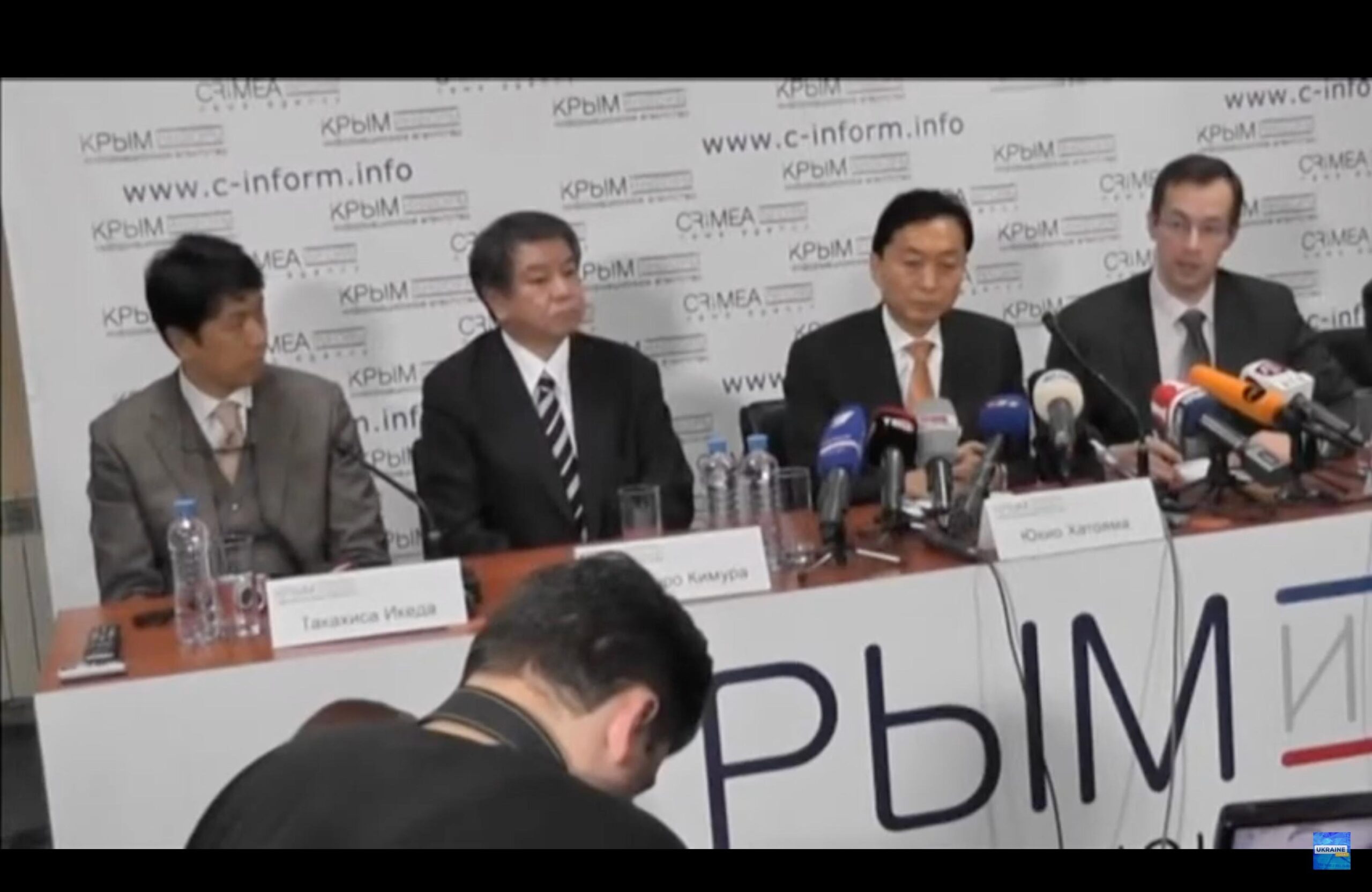
The photograph below captures Hatoyama’s presence at the Russia Day Reception, organized by the Russian Federation Embassy in Japan (‘Reception on the Occasion of Russia Day Held at the Russian Embassy in Tokyo’ 2022). The image also features Mitsuhiro Kimura, the leader of Issuikai, visible in the left corner of the frame on the left-hand picture.
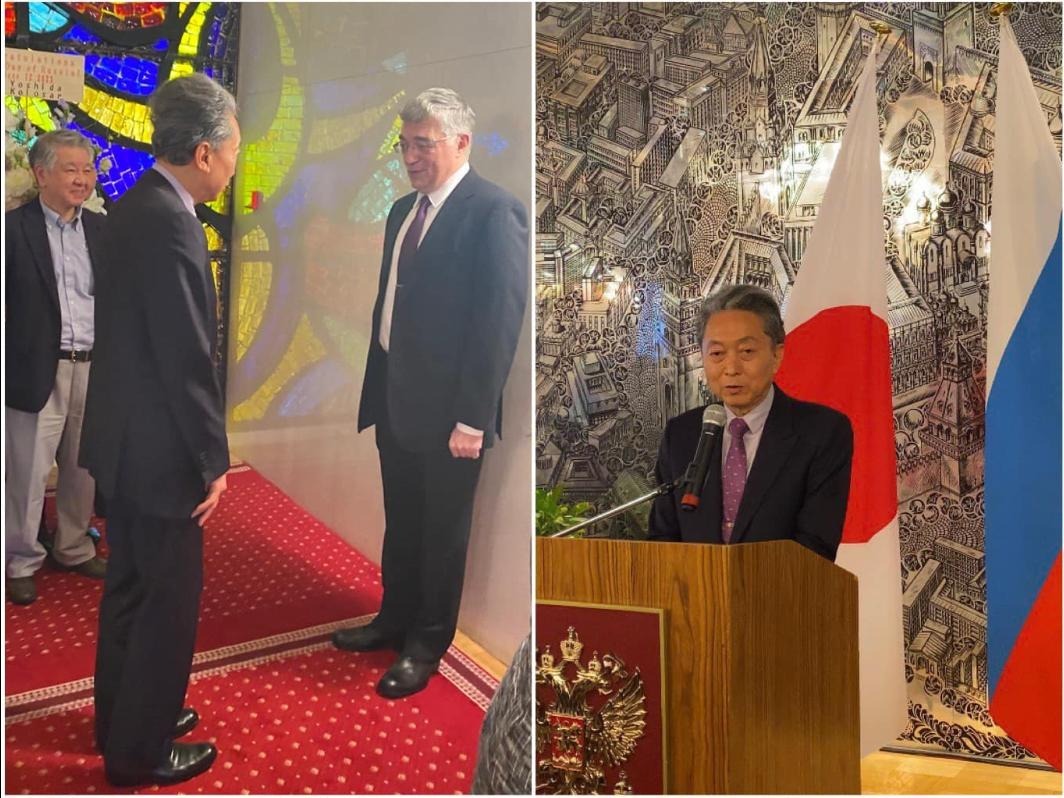
Data and Methods
For this study, we analyzed data collected from Yukio Hatoyama’s Twitter account2 3 for the period of February 24th to December 31st, 2022, using the platform’s public API (table 1). To accomplish this task, we built a corpus and used a free corpus analysis tool called AntConc, developed by Laurence Anthony.
The analysis of gathered data involves qualitative and quantitative methods of corpus linguistics and discourse analysis. The quantitative method includes studying frequently used terms and language patterns to identify the main topics consistently discussed or possible shifts in his posts and the ideological framing behind them.

In the qualitative part, we analyzed posts related to Russia or Ukraine filtered by keywords4. This in-depth examination allowed us to gain insight into the nuances and underlying meanings of the content. By combining both methods we were able to develop a comprehensive understanding of the discussions surrounding Russia and Ukraine during the study period. Moreover, we also analyzed posts that were collected prior to the full-scale invasion of Ukraine to reveal changes in the discourse surrounding these topics before and after the war (figure 1).
Quantitative Analysis
Our analysis of Yukio Hatoyama’s Twitter account for the year 2022 reveals that in a total of 109 tweets, he posted about Ukraine and Russia in 21 posts (19% of all tweets in the study period). The word “Ukraine” (ウクライナ) appears among the top five most frequently used keywords in the studied period, together with other terms such as “USA” (米国), “Prime Minister” (首相), “nuclear” (核), and “Japan” (日本).
Hatoyama’s tweets cover various topics, including the Russian invasion of Ukraine, Taiwan, and South Korea, Japan’s economy and defense, the nuclear phase-out, Abe’s funeral, particularly reflecting on his relationship with the Unification Church (cf. Poppe 2022), and the Dentsū scandal related to the Olympics (cf. The Guardian 2023) (see table 2).
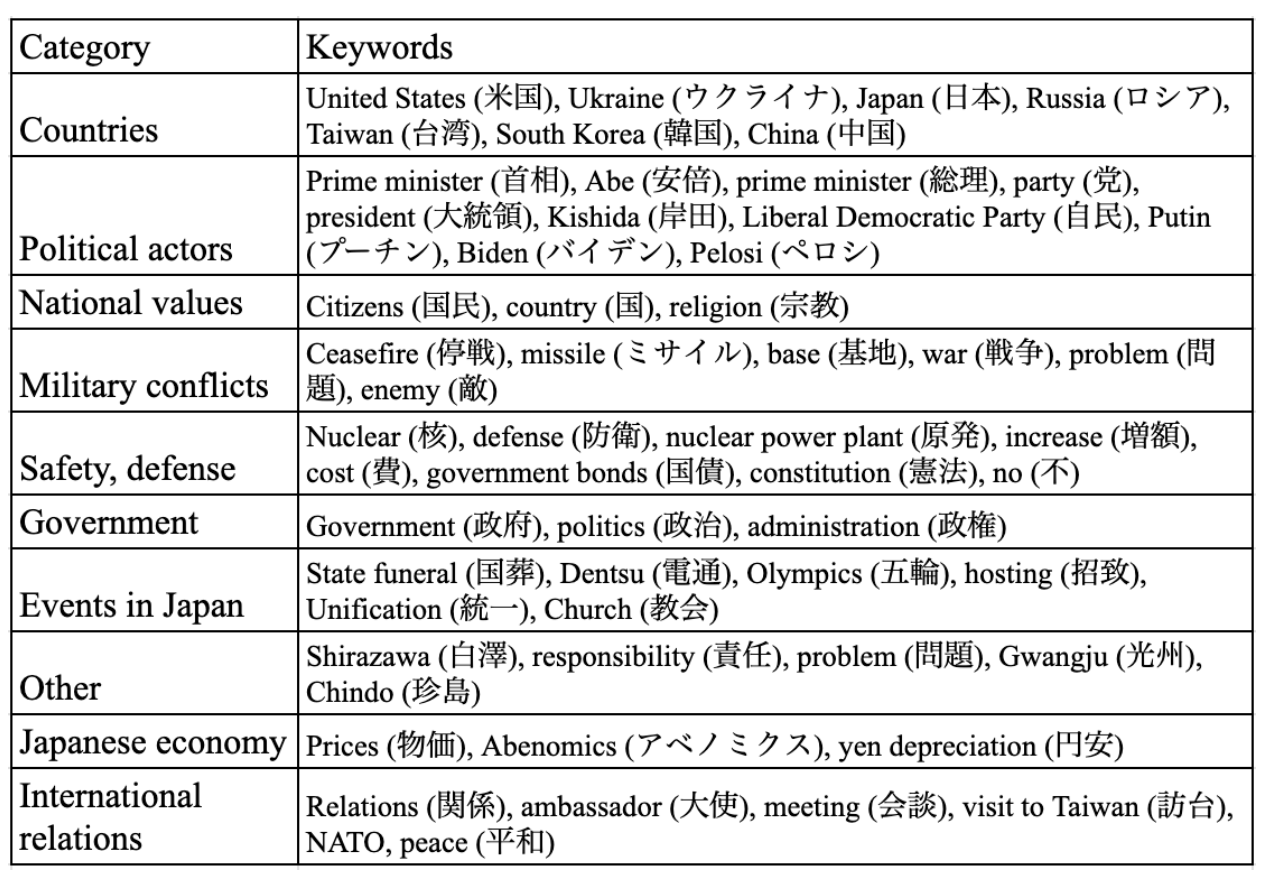
Regarding the Russian invasion of Ukraine, Hatoyama’s tweets were limited to two time periods – March-April and October when he expressed his concerns regarding Russian Ambassador to Japan Mikhail Galuzin’s return to Russia (cf. fig. 1). From May to September, his focus shifted primarily to criticizing Japan’s economic situation, relating the recession not to the war, but mostly to the inefficacy of the economic policy of former Prime Minister Abe, also termed Abenomics. He also criticizes Abe’s failure in the negotiations with Russia regarding the Northern Territories and expressed deep concerns about Japan’s government siding with the United States regarding the Taiwan issue. He argued that Japan thereby exhibits a similar US-dependent stance as with the war in Ukraine, as the following tweet shows:
Pelosi, the speaker of the U.S. House of Representatives, visited Taiwan. The United States ignored Russia’s concerns about Ukraine’s membership in NATO and went ahead with it, becoming a major cause of war. Instead of learning lessons from the Ukraine war, the United States seems to be repeating the same mistakes in Taiwan. So foolish. It would also be foolish if Japan followed the United States in this obediently.5
When referring to the Russian invasion, Hatoyama used belittling terms such as “issue” (問題) or “situation” (情勢) interchangeably with “war” (戦争). This choice of language may reflect his attempt to downplay the severity of the war or his personal stance on the issue.
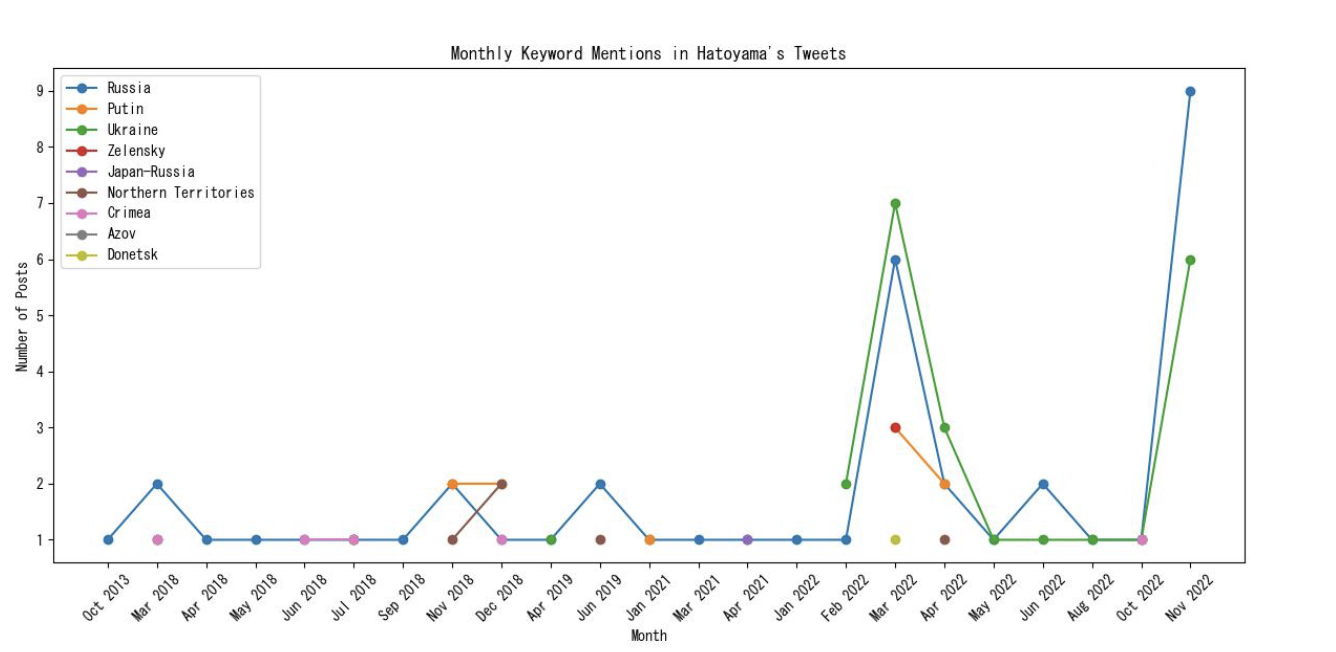
Qualitative Analysis: Anti-Western Narratives and Selective Perception Towards the War in Ukraine
Figure 2 shows that the most utilized narratives by Hatoyama are anti-Western narratives. Hatoyama, as well as Issuikai (cf. Kalashnikova and Schäfer 2024), is in direct opposition to the ruling party (LDP) and openly criticizes not only the economic policies of the current government but also the Japan-American relations, instead advocating for greater independence in foreign relations. In an interview with Russian state media right before the Russian invasion of Ukraine, he criticized the Japanese government for allegedly misjudging the situation regarding the possible Russian attack on Ukraine, under the influence of the United States (TASS 2022). The central narrative in Hatoyama’s posts revolves around his criticism of the Japanese government’s support for Ukraine, especially concerning Japan’s geostrategic alliance with the United States. The underlying message is that “the West” cannot be trusted as a partner and is only interested in profiting from the war while hindering peace negotiations.
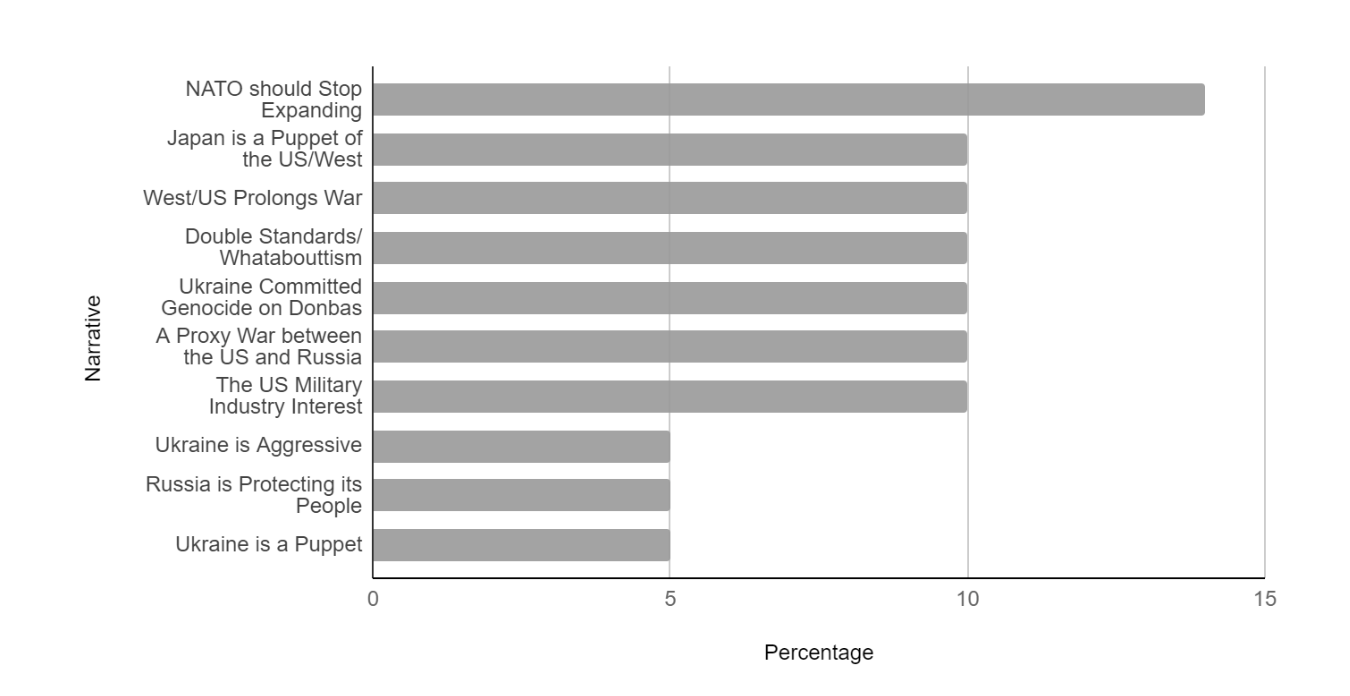
Figure 2. Pro-Russian narratives in Hatoyama’s tweets
The narratives aiming at discrediting Ukraine revolve around presenting Ukraine as an aggressive state, suggesting that the country (a) prolongs the war through aggressive conduct instead of diplomatic initiatives, including the “destruction” (破壊) of the Crimean Bridge leading to the potential provocation of nuclear attack as a response from Russia, and (b) is involved in alleged acts of genocide against pro-Russian populations in eastern Ukraine, which in turn triggered the Russian invasion (see figure 3).
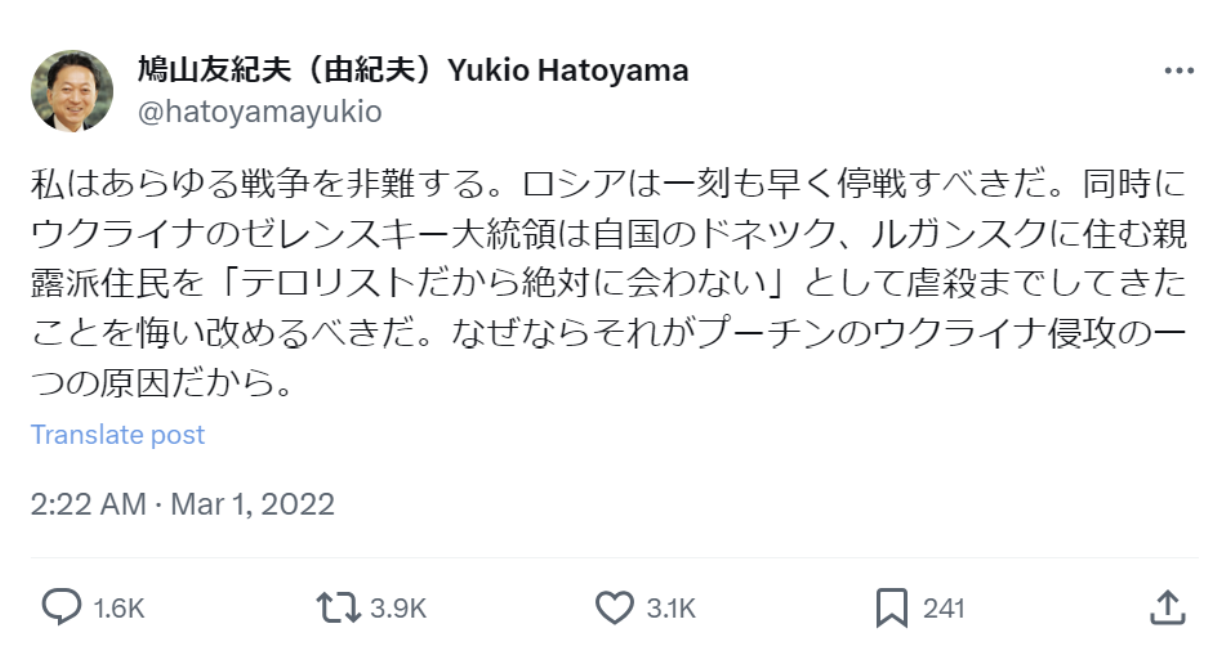
Figure 3. Hatoyama’s tweet6 (1) related to the alleged genocide of the pro-Russian population in eastern Ukraine
It is particularly two tweets related to the Bucha atrocities that show Hatoyama’s selective perception and compatibility with the position of the Kremlin in cases where it suits his political objectives. The first one (see figure 4), dated April 5th, 2022, suggests that if the news of 400 killed civilians in Bucha were confirmed, Russia should be prosecuted for those actions. However, he continues, Ukraine should also face similar accountability for the alleged murder of 10,000 pro-Russian civilians in Eastern Ukraine, but also the USA for having killed hundreds of thousands of Iraqis and Afghans, or the atomic bombing of Japan, just as the Japanese military for the Nanjing Massacre. The tweet appears to be drawing relativizing comparisons between these different incidents and advocating for justice. Moreover, Hatoyama raises skepticism about the reported atrocities of the Russian army in Bucha. He contrasts this event with the alleged murder of pro-Russian civilians in Eastern Ukraine as an equally established fact and downplays the severity of the Bucha atrocities by associating them with other, supposedly more serious acts.
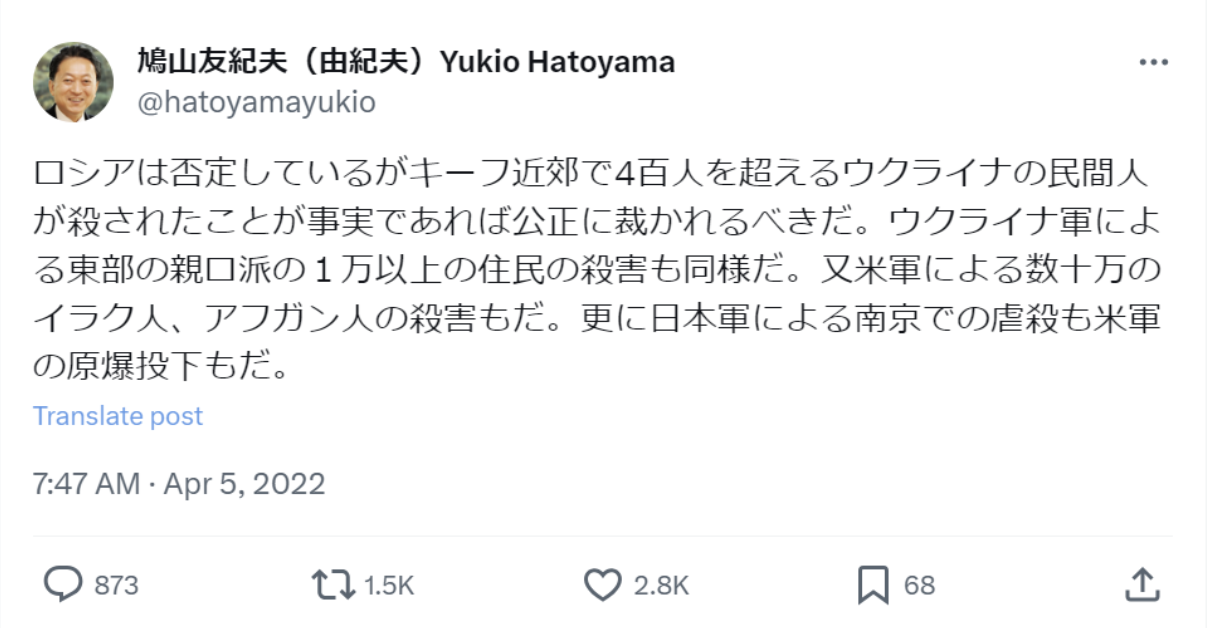
Figure 4. Hatoyama’s tweet7 (2) related to the comparison of Bucha atrocities to other war crimes and alleged genocide of the pro-Russian population in eastern Ukraine.
In another tweet (see figure 5) posted on November 17th, 2022, Hatoyama addresses the missile incident on Polish territory8. He draws parallels between suspicions about Russia’s involvement in the attack and accusations regarding its connection to the Bucha massacre. Additionally, Hatoyama raises doubts about whether the missile strike was an interception of a Russian missile and accuses Ukraine and Great Britain of having a “plan,” the details of which Hatoyama does not reveal.
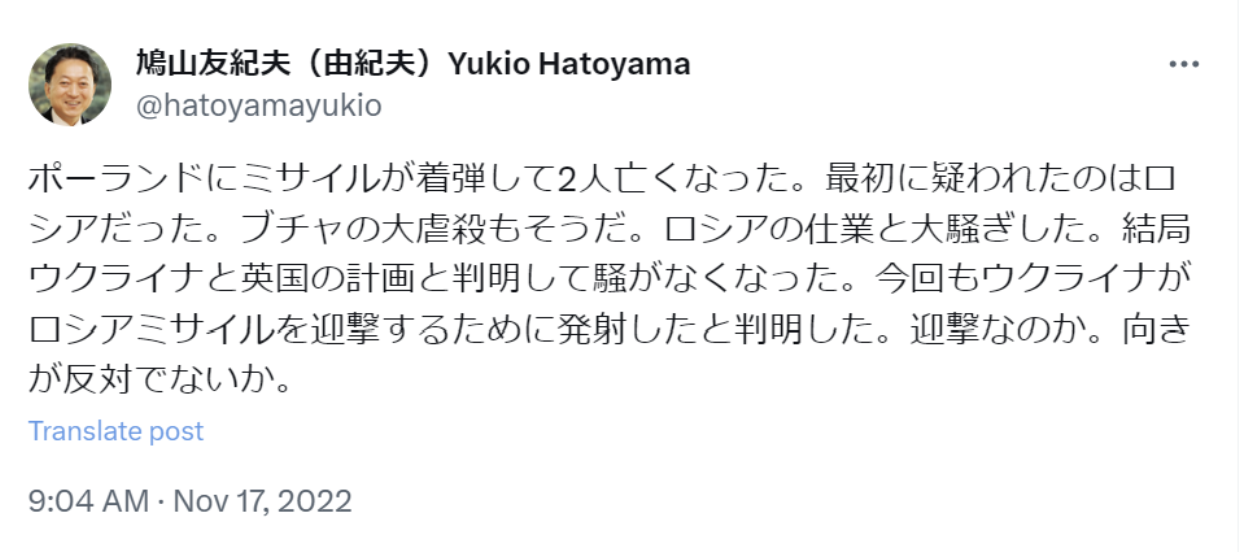
Figure 5. Hatoyama’s tweet9 (3) related to the missile incident on Polish territory.
However, such adaptability of his position could reflect a more pragmatic approach in his pro-Russian stance by prioritizing pre-established ideological stances over strict alignment with Russian narratives. An example of this adaptability can be seen in a tweet (figure 6) in which he condemns the seizure of the Zaporizhia Nuclear Power Plant by the Russian army, which is rather expressing an anti-nuclear framing of the event. This tweet highlights that Hatoyama is only committed to a pro-Russian stance when it is in line with his own political agenda.
Figure 6. Hatoyama’s tweet10 (4) related to the seizure of the Zaporizhia Nuclear Power Plant by the Russian army.
In conclusion, while Hatoyama’s anti-Western rhetoric and pro-Russian stance may align with his political goals, his selective perception and adaptability suggest that his views are not solely based on strict adherence to Russian narratives.
References
Hall, Ben. 2021. ‘Ukrainian Leader Calls for Revamp of Peace Process to End Donbas War’. Financial Times, 26 April 2021.
Kalashnikova, Olena, and Fabian Schäfer. 2024. ‘Russian State-Controlled Propaganda and Its Proxies: Pro-Russian Political Actors in Japan. The Asia-Pacific Journal: Japan Focus 33 (3). https://apjjf.org/2024/3/shafer-kalashnikova.
Poppe, Stevie. 2022. ‘“From Y”: A Mixed-Method Analysis of the Twitter Account of Abe Shinzō’s Killer – Digital Japan Lab’. 19 August 2022. https://www.digital-japan.org/2022/08/19/analysis-of-the-twitter-account-of-abe-shinzos-killer/.
‘Reception on the Occasion of Russia Day Held at the Russian Embassy in Tokyo’. The Embassy of the Russian Federation in Japan. 9 June 2022. https://tokyo.mid.ru/en/novosti_posolstva/reception_on_the_occasion_of_russia_day_held_at_the_russian_embassy_in_tokyo/.
Santora, Marc, and Maria Varenikova. ‘Poland Suggests Russian-Made Missile Killed 2 Inside Its Borders’. The New York Times, 16 November 2022, sec. World. https://www.nytimes.com/2022/11/15/world/europe/poland-ukraine-russia-nato.html.
Shekhovtsov, Anton. 2019. ‘Foreign Observation of the Illegitimate Elections in South Ossetia and Abkhazia in 2019’. European Platform for Democratic Elections. https://www.academia.edu/41212582/Foreign_Observation_of_the_Illegitimate_Elections_in_South_Ossetia_and_Abkhazia_in_2019.
TASS. ‘Former Japanese PM Says Tokyo May Misjudge Ukraine Crisis Because of US’, 10 February 2022. https://tass.com/world/1401043.
The Embassy of the Russian Federation in Japan. ‘🇷🇺6月9日、在日ロシア連邦大使館に’. Facebook. 9 June 2022. https://www.facebook.com/story.php?story_fbid=579427714285443&id=100066546578635&paipv=0&eav=AfZLbS7jzaAWoht-bSJ2ZPikGDIpg8HVy7w1CR_6kJHkZYGonr0HZq7zivnRrMENCSw&_rdr.
The Guardian. ‘Japan’s Top Ad Agency Indicted over Olympics Bid-Rigging Scandal’, 28 February 2023, sec. World news. https://www.theguardian.com/world/2023/feb/28/japan-top-ad-agency-dentsu-indicted-olympics-bid-rigging-scandal.
- Twitter was rebranded to X in July 2023. However, for the purposes of this study, we will continue to use the previous name due to the collected data timeframe.
- Data collected on October 2023.
- Yukio Hatoyama additionally to his Twitter account posts videos on the channel of East Asian Community Institute (東アジア共同体研究所) on YouTube (19500 Subscribers). Hatoyama founded the East Asian Community Research Institute in 2013 after retiring from his political activities and assuming the post of chairman. The goal of the East Asian Community Institute, as described on its website, is to realize a non-war community in East Asia based on the concept of fraternity. The proposed approach involves Japan, China, and South Korea establishing a permanent forum for discussion, where various issues such as economics, trade, culture, environment, security, and more can be addressed.
- The posts were selected if containing keywords: ’ウクライナ’, ’ゼレンスキー’, ’ロシア’, ’プーチン’, ’キエフ’, ’キーウ’ (‘Ukraine’, ‘Zelenskyy’, ‘Russia’, ‘Putin’, ‘Kiev,’ ‘Kyiv’), and ’露-’ (‘Russian’) containing words related to Russia, such as ’中露’, ’日露’, ’露軍’ (‘China-Russia’, ‘Russian-Japanese’, ‘Russian military’)’
- ペロシ米下院議長が台湾を訪問した。ウクライナのNATO加盟を巡って、米国はロシアの不安を無視して突っ走り、戦争を招く大きな原因となった。米国はウクライナ戦争から教訓を学ぶどころか、台湾でも同じ間違いを繰り返そうとしている。愚かだ。その米国に唯々諾々とついて行けば、日本もまた愚かだ (3.08.2022).
- I condemn all wars. Russia should cease fire immediately. At the same time, President Zelenskyy of Ukraine should repent for having massacred the pro-Russian residents of Donetsk and Lugansk of his own country, saying, “I will never meet them because they are terrorists.”* Because that’s one of the reasons for Putin’s invasion of Ukraine. * President Zelenskyy called “terrorists” leaders of DNR and LNR in the interview to the Financial Times (Hall 2021) that transformed into calling calling “terrorists” the residents of Donetsk and Lugansk in Hatoyama’s tweet.
- Although Russia denies it, if it is true that more than 400 Ukrainian civilians were killed near Kyiv*, it should be justly prosecuted. The same goes for the murder of more than 10,000 pro-Russian residents in the east by the Ukrainian military. And the hundreds of thousands of Iraqis and Afghans killed by the U.S. military. As well as the atrocities committed by the Japanese military in Nanjing and the dropping of the atomic bomb by the US military.
*Although Hatoyama attempted to transliterate the name of the Ukrainian capital ‘Kyiv’ in accordance with the new spelling system adopted by Japan in 2022, which reflects the phonology of the Ukrainian language, he made an error resulting in a spelling that lies somewhere between the old ‘キエフ’ and the new ‘キーウ’ transliterations.
- When a Russian-made missile fragment fell on Polish territory on November 15 killing two people (Santora and Varenikova 2022).
- A missile struck Poland, resulting in the death of two people. Initially, Russia was suspected. The same goes for the Bucha massacre. Russia was blamed, causing a major uproar. Ultimately, it was revealed to be a plan by Ukraine and the UK, and the fuss stopped. This time, it has been revealed that Ukraine launched the missile to intercept a Russian missile. Is it truly interception? Isn’t the direction opposite?
- It is reported that the Russian military has shelled and taken control of Ukraine’s nuclear power plant. This is not an acceptable behavior. Putin should stop the war as soon as possible. What has become clear from this is that nuclear facilities are vulnerable targets in times of war. We must eliminate war through the spirit of fraternity and eliminate nuclear power not only from Japan but from the world.

